seasonal allergy support
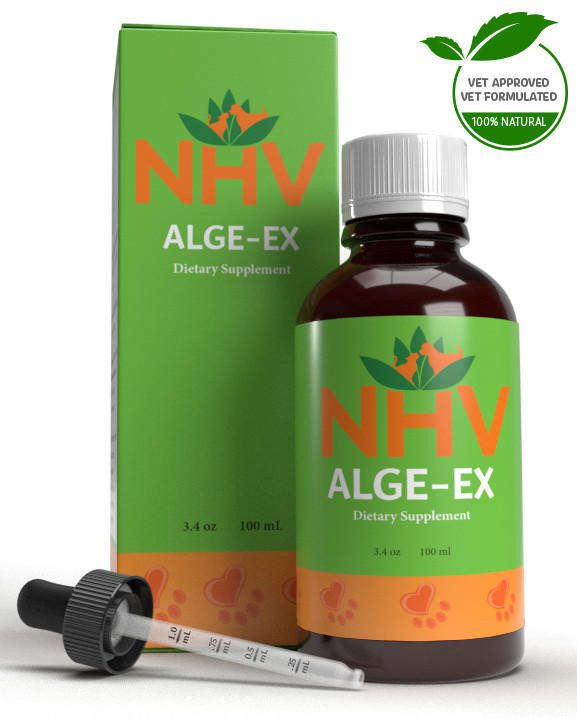
free shipping over $100 (USA & Canada)
1-877-937-4372 the pet expert hotline
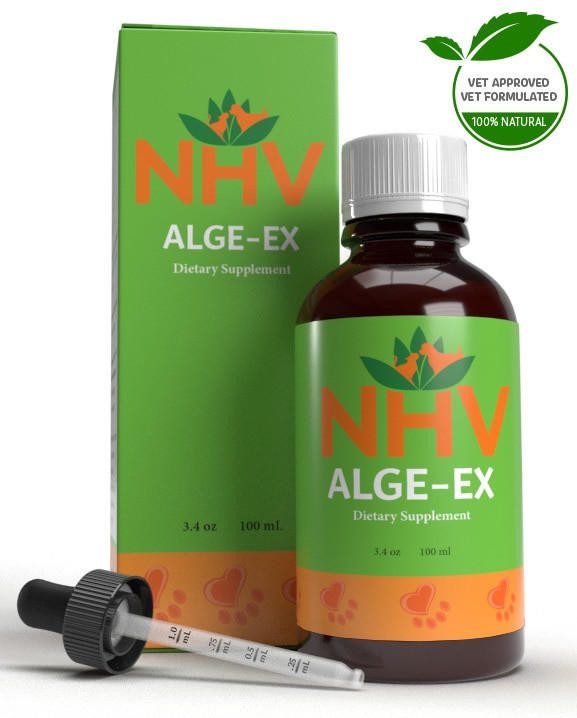

Allergies are caused by an overreaction of the immune system to a harmless substance.
Symptoms of environmental allergies in dogs and cats are similar to humans -- itchy and watery eyes, a runny nose, frequent sneezing, and itchy skin. Common environmental allergens like pollen, spores, dust, mold, and perfumes can trigger these symptoms of allergies in dogs and cats.
Allergies are caused by an overreaction of the immune system to a substance that is typically harmless. When a pet is allergic to pollen, for example, the body will sense danger from the substance, even though none typically exists. To combat that ‘danger’, the body releases a substance called histamine. Histamine causes the symptoms of allergies which we see, such as runny eyes and nose, sneezing, and itching. This is why pharmaceuticals to combat allergic responses are called anti-histamines.
There are a few ways you can help your pet who suffers from environmental allergies. Allergy season is a particularly worse time for pets with asthma. These tips will help you reduce their asthma symptoms too.
This can be easier said than done because allergy season is also the best time to head outdoors with your pet. But if your pet is allergic to certain plants or to pollens, try to avoid too much outdoor activity during pollen season and when those plants are blooming. There are many indoor play parks for dogs, or exploring a nearby urban area may be an option to avoid plants and pollens as well.

Use high-quality air filters in your home. HEPA filters are rated to remove very small particles like pollens. Change the filters in your heating or cooling systems regularly, and place efficient air filters throughout your home.
Allergens can collect on surfaces like bedding, outerwear, and even their dishes. Regularly laundering the washable items will help keep this build-up at a minimum. If your pet frequents an area that can’t easily be laundered (like your couch), provide clean blankets or sheets to cover the area. Keep their bowls and water dishes clean. In allergy season, you might need to do this 2-3 times a day.
After walks or potential contact with allergens, wipe your pet down with a damp cloth. A full bath isn’t always required. Pollens and small particles can stick to the fur and follow your pet around. A good wipe down can help to remove these allergens. Bathing once weekly if possible is also a good idea.
Allergens can cause itchiness, which causes your pet to lick and chew. This damages the protective layer of the skin, which then leaves the body more prone to allergens and infections, causing further itching. It is extremely important to break this cycle and allow the skin to heal.
NHV Alge-Ex can help your pet’s body control and balance the histamine response while simultaneously reducing the symptoms:
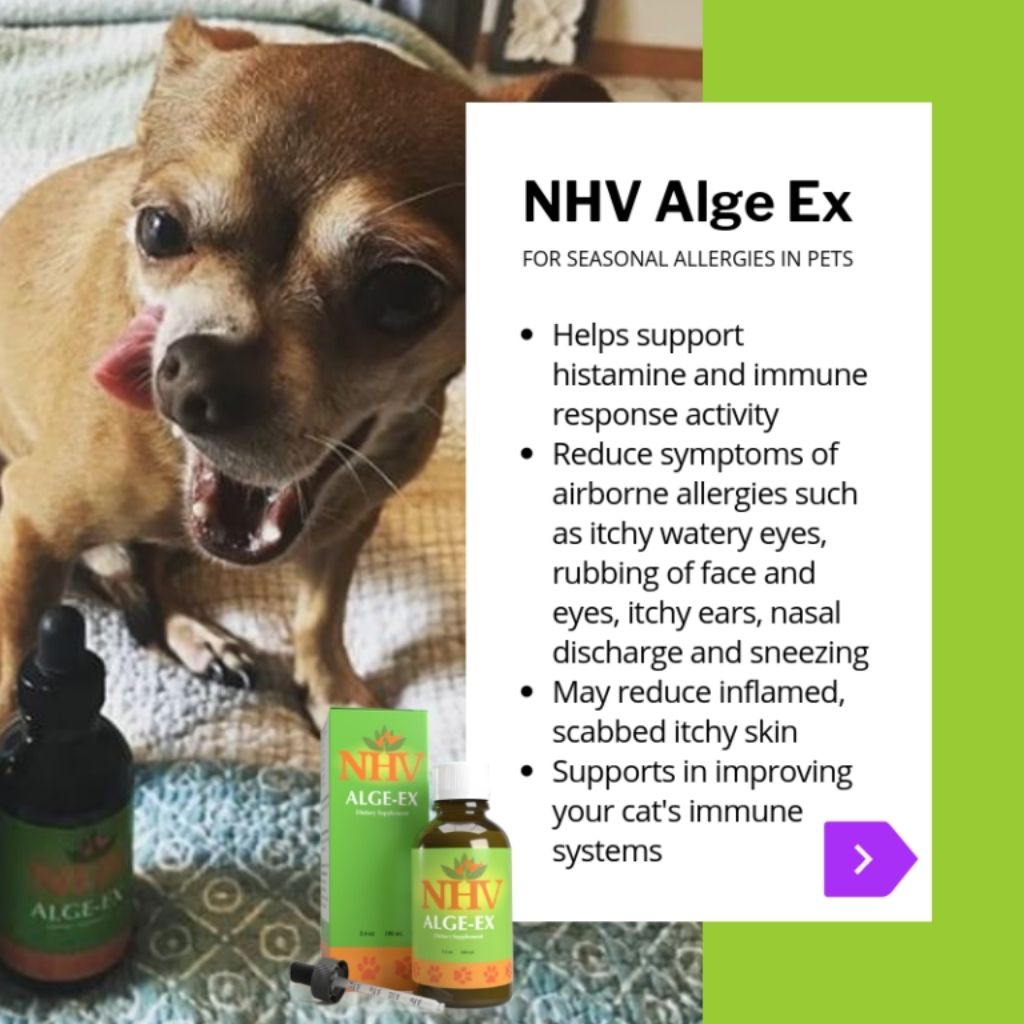
NHV Ouch Away Spray can help break this cycle and bring some soothing relief from allergies in dogs and cats. Use the Ouch Away Spray on the sore and inflamed area (avoid using on an open wound). Hold your pet steady for 10-15 minutes so that the skin gets a chance to soak it in. This will help reduce itchiness and inflammation. This spray is all-natural and if your pet ends up licking it, it is perfectly safe.
Never bandage any wounds or raw areas on your pet without your veterinarian’s guidance. A loose t-shirt or ‘onesie’ may fit your pet to cover a raw area, but still, allow it to breathe and dry out. Your pet may also need to wear a ‘cone’ for some time while the skin heals.
Omega-3 fatty acids are anti-inflammatory nutrients that can help with conditions like asthma and allergies in dogs and cats. You can do a vet-prepared homemade recipe that includes sardines, tuna, and salmon or you can find a high-quality commercial food that includes fish as one of the ingredients. These healthy fatty acids contribute to overall skin health, besides supporting the body’s immune system. Supplementing your dog or cat’s diet with Omega-3s is also a great idea. NHV PetOmega 3 is vet formulated to suit pets and can be given once daily to bring all the superb benefits of Omega-3s to your pet.
Allergies in cats and dogs can be very difficult to diagnose and treat. Preparing in advance can help your pet the best.

Spring season is when environmental allergies get really bad. But even the rest of the year factors like smoke, dust, and perfumes can bother your pet. If your cat or dog is prone to environmental allergies or is asthmatic, you can talk to an NHV Pet Expert like me about your pet’s health, just send us your message here and we will help put together a regimen that can support your pet with allergies.
seasonal allergy support

For Environmental and Seasonal Cat Allergies
buy 2 and save $3
3 month supply for a small to medium size pet.
A safe and fast-acting herbal supplement that helps your cat to fight seasonal and environmental allergies, as well as their associated symptoms.

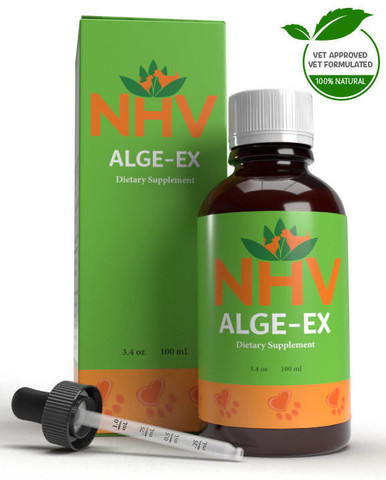
A safe and fast-acting herbal supplement that helps your cat to fight seasonal and environmental allergies, as well as their associated symptoms.

Cats can have seasonal allergies just like people. A cat’s immune system will respond and react to everyday allergens found in the environment. Like people, cats can have an allergy to pollen, mold, grass, ragweed, and dust mites. They can also be allergic to certain household products such as cleaners, carpet fibers, carpet deodorizers, insecticides, rubber, and other things in the form of contact dermatitis. Your pet’s immune system might overreact to these common unharmful environmental substances.
You can help support your pet’s immune reaction to these airborne irritants by using herbal supplements. Made with powerful, yet gentle ingredients such as eyebright, feverfew, and Sweet goldenrod, Alge-Ex helps to soothe your cat’s histamine response. This remedy for cats with seasonal allergies is vet-formulated and pet-approved. It's 100% natural and completely safe to be taken along with conventional medicine, and easy to administer. Order NHV supplements today, or contact us to speak with one of our pet experts about the best natural remedies for your cat.
It’s best to ensure that your pet is not dealing with skin allergies due to food allergies. If you suspect this, try a different brand of food that is clean, holistic, and without preservatives.
Bathing your pet is also an excellent way of helping your cat cope with seasonal allergies. Bathing helps remove pollen, mold, and other allergens on cats and also provides relief. Make sure to give your pet plenty of filtered water.
Never attempt to diagnose your cat on your own. Your vet will be able to perform the required test and make the necessary suggestions.
Eyebright - An herb that has a long history of use for its anti-inflammatory, antibacterial, antifungal, anti-catarrhal, and antiviral activities. Due to the anti-inflammatory properties, eyebright is used for upper respiratory tract infections, hay fever, sinusitis, and catarrh (inflammation of the mucous membranes). As an astringent, it is used for dry congestion. It is considered to be useful for seasonal allergies, pollen, and mold allergies in cats. It also relieves itchy eyes.
Ginger - A pungent and aromatic root used as a spice to enhance flavor in food. The part used is the rhizome, which has been used for thousands of years for nausea and gastrointestinal relief. Research has shown that ginger has excellent antioxidant and anti-inflammatory properties.
Feverfew - An herb originally native to Eastern Europe, it has been used to reduce migraines. Studies have shown that Feverfew inhibits the release of histamine and serotonin. It is considered to be very safe for cats and is used as an alternative to aspirin, which can be toxic to cats.
European Goldenrod - An herb with anti-inflammatory, anti-catarrhal, and antioxidant properties. It helps increase renal blood flow and glomerular filtration rate without stimulating the loss of sodium and chloride.
Echinacea - In human and animal experiments, Echinacea preparations have been shown to have immunostimulant effects. Its defense against microorganisms help the body fight infections and remove invading bacteria. Echinacea also supports the lymph system, which in turn expels waste from the tissues.
Select your pet's weight to determine the correct dose.
To be taken twice daily. Determine your pet’s weight and then use the easy chart below to determine the correct dose. This is the minimum dosage.
Pet's Weight Dosage
0 - 15 lb = 0.5 ml
16 - 30 lb = 1.0 ml
31 - 45 lb = 1.5 ml
46 - 60 lb = 2.0 ml
61 - 75 lb = 2.5 ml
Over 75 lb = 3.0 ml
How to Administer: Shake well before use. The easiest method is to use the dropper provided and place the drops into your pet’s food or favorite treat. You can also use the dropper and squirt directly into the pet’s mouth. Some pets can be finicky, if this occurs consider hiding the drops in foods most pet’s love such as fish, chicken, yogurt, or a favorite treat. If your pet only eats dry food then soak a few kibbles at feeding time.
For Best Results
Herbal dietary supplements are beneficial to the health and well-being of your pet and are safe for long-term use. Every pet responds to natural herbal supplements differently, therefore it is important to be consistent and administer the product daily. Supplements generally take two to four weeks to take effect, however this will vary from one animal to the next.
Product Storage
All NHV Natural Pet Products are pure herbal extracts and contain no artificial additives, preservatives, or coloring. Shelf life after opening is 6 months and must be refrigerated after opening.
Cautions and Contraindications
Do not use Alge-Ex in pregnant or nursing animals.
Speak to your vet before using our products. A second visit is recommended if your pet’s condition does not improve, or deteriorates after continued use of the supplements.
All information provided by NHV Natural Pet Products is for educational purposes only.
Cats can have seasonal allergies just like people. A cat’s immune system will respond and react to everyday allergens found in the environment. Like people, cats can have an allergy to pollen, mold, grass, ragweed, and dust mites. They can also be allergic to certain household products such as cleaners, carpet fibers, carpet deodorizers, insecticides, rubber, and other things in the form of contact dermatitis. Your pet’s immune system might overreact to these common unharmful environmental substances.
You can help support your pet’s immune reaction to these airborne irritants by using herbal supplements. Made with powerful, yet gentle ingredients such as eyebright, feverfew, and Sweet goldenrod, Alge-Ex helps to soothe your cat’s histamine response. This remedy for cats with seasonal allergies is vet-formulated and pet-approved. It's 100% natural and completely safe to be taken along with conventional medicine, and easy to administer. Order NHV supplements today, or contact us to speak with one of our pet experts about the best natural remedies for your cat.
It’s best to ensure that your pet is not dealing with skin allergies due to food allergies. If you suspect this, try a different brand of food that is clean, holistic, and without preservatives.
Bathing your pet is also an excellent way of helping your cat cope with seasonal allergies. Bathing helps remove pollen, mold, and other allergens on cats and also provides relief. Make sure to give your pet plenty of filtered water.
Never attempt to diagnose your cat on your own. Your vet will be able to perform the required test and make the necessary suggestions.
Eyebright - An herb that has a long history of use for its anti-inflammatory, antibacterial, antifungal, anti-catarrhal, and antiviral activities. Due to the anti-inflammatory properties, eyebright is used for upper respiratory tract infections, hay fever, sinusitis, and catarrh (inflammation of the mucous membranes). As an astringent, it is used for dry congestion. It is considered to be useful for seasonal allergies, pollen, and mold allergies in cats. It also relieves itchy eyes.
Ginger - A pungent and aromatic root used as a spice to enhance flavor in food. The part used is the rhizome, which has been used for thousands of years for nausea and gastrointestinal relief. Research has shown that ginger has excellent antioxidant and anti-inflammatory properties.
Feverfew - An herb originally native to Eastern Europe, it has been used to reduce migraines. Studies have shown that Feverfew inhibits the release of histamine and serotonin. It is considered to be very safe for cats and is used as an alternative to aspirin, which can be toxic to cats.
European Goldenrod - An herb with anti-inflammatory, anti-catarrhal, and antioxidant properties. It helps increase renal blood flow and glomerular filtration rate without stimulating the loss of sodium and chloride.
Echinacea - In human and animal experiments, Echinacea preparations have been shown to have immunostimulant effects. Its defense against microorganisms help the body fight infections and remove invading bacteria. Echinacea also supports the lymph system, which in turn expels waste from the tissues.
Select your pet's weight to determine the correct dose.
To be taken twice daily. Determine your pet’s weight and then use the easy chart below to determine the correct dose. This is the minimum dosage.
Pet's Weight Dosage
0 - 15 lb = 0.5 ml
16 - 30 lb = 1.0 ml
31 - 45 lb = 1.5 ml
46 - 60 lb = 2.0 ml
61 - 75 lb = 2.5 ml
Over 75 lb = 3.0 ml
How to Administer: Shake well before use. The easiest method is to use the dropper provided and place the drops into your pet’s food or favorite treat. You can also use the dropper and squirt directly into the pet’s mouth. Some pets can be finicky, if this occurs consider hiding the drops in foods most pet’s love such as fish, chicken, yogurt, or a favorite treat. If your pet only eats dry food then soak a few kibbles at feeding time.
For Best Results
Herbal dietary supplements are beneficial to the health and well-being of your pet and are safe for long-term use. Every pet responds to natural herbal supplements differently, therefore it is important to be consistent and administer the product daily. Supplements generally take two to four weeks to take effect, however this will vary from one animal to the next.
Product Storage
All NHV Natural Pet Products are pure herbal extracts and contain no artificial additives, preservatives, or coloring. Shelf life after opening is 6 months and must be refrigerated after opening.
Cautions and Contraindications
Do not use Alge-Ex in pregnant or nursing animals.
Speak to your vet before using our products. A second visit is recommended if your pet’s condition does not improve, or deteriorates after continued use of the supplements.
All information provided by NHV Natural Pet Products is for educational purposes only.
dermatitis relief
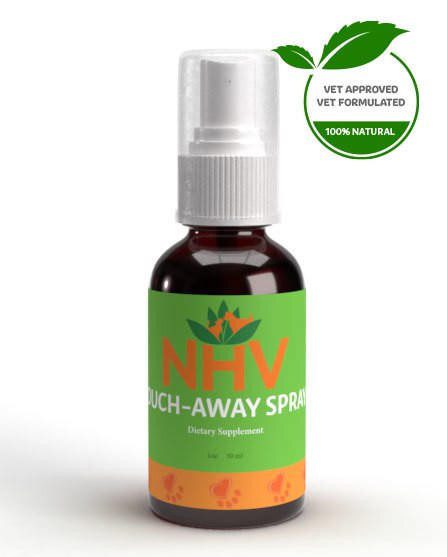
Holistic Support for Dermatitis, Mange and Yeast Infections
buy 2 and save $3
Your furkiddo’s skin can be sensitive to things like environmental allergies, biting insects, fungal overgrowth and much more! To self-soothe, your pup may start to bite, lick, or scratch themselves causing inflammation and possible hair loss. NHV Ouch Away, dog skin infection spray, helps your pup get on top of skin and coat issues naturally.

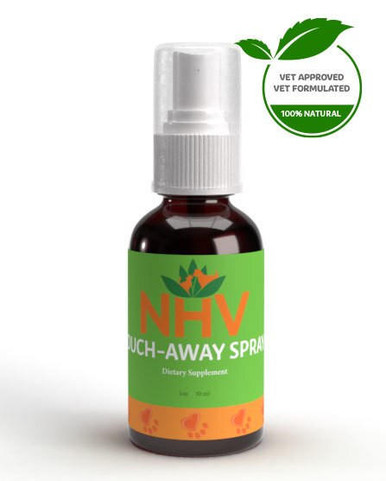
Your furkiddo’s skin can be sensitive to things like environmental allergies, biting insects, fungal overgrowth and much more! To self-soothe, your pup may start to bite, lick, or scratch themselves causing inflammation and possible hair loss. NHV Ouch Away, dog skin infection spray, helps your pup get on top of skin and coat issues naturally.

Natural Support for Dermatitis, Mange and Skin Infections
Your pup's skin is their largest organ! And because of this, their skin is constantly susceptible to infection, airborne irritants, icky biting insects and much more. Your furkiddo will scratch and bite when they are feeling stressed and have ouchies on their body. This obsessive behavior can introduce unwanted bacteria, whether it is from the environment or your pup’s own body, which can lead to infection. An itchy, inflamed ‘dog hot spot’ can be the end result. If these dog hot spots are left untreated, they can progress to secondary skin infections, abscesses or even metastatic tumors (eg. carcinoma). Ouch Away spray, dog skin infection spray, helps heal inflamed, itchy skin and promotes hair regrowth.
How NHV's Dog Skin Infection Spray Relieves Irritated Skin
Since your pup’s skin is their largest organ, it probably doesn't surprise you that skin issues are the most common health concern in dogs. These include (but are not limited to) dermatitis, mange and skin infections.
Dermatitis in dogs is a hypersensitivity or allergic reaction to a variety of common and typically harmless environmental substances. These allergens include grasses, pollens, house dust mites, or mold spores. Breeds predisposed to developing allergies include Chinese Shar-Peis, Wire Fox Terriers, Golden Retrievers, Dalmatians, Boxers, Boston Terriers, Labrador Retrievers, Lhasa Apsos, Scottish Terriers, Shih Tzus, and West Highland White Terriers. However, any breed (purebred or mixed) can be susceptible to allergies. The areas most affected are generally the paws, face, ears, front legs, and abdomen, but scratching all over the body is fairly common too. Ouch Away Spray for dog skin infections, contains ingredients like Chamomile, Marigold and Aloe vera that cools and soothes wounds, burns and irritated skin while strengthening the immune system.
The most common signs of dermatitis in dogs are:
Dog mange is caused by mites and can lead to inflamed skin and nasty sores. Scabies or sarcoptic mange is contagious and is transmissible to humans. Black mange is not transmissible to humans due to it being a genetic condition. Secondary bacterial and yeast infections may develop if left untreated while sores on the skin can build up and release a powerful musty odor. You can learn more about mange and how to help your dog if they are suffering from it in Dr. Cook's article on mange. Ingredients like Rosemary, Tea Tree oil and Lemongrass oil, within the Ouch Away Spray, are effective topically against external parasites, combating skin infections and helping to stimulate fur regrowth (from constant biting and scratching).
Help Support Your Dog Naturally
NHV Ouch Away Spray, dog skin infection spray, is an effective topical spray that is 100% natural and vet-formulated to soothe your pup’s skin, coat issues, and dog hot spots. To learn more about what causes dog hot spots and how to help your furry friend, read our vet talk or watch our video about skin infections. Get in touch with an NHV pet expert if you have any questions or concerns about skin and coat health - we are always here to help!
Made with the finest, organically grown, or ethically harvested herbs. Made specifically for pets, vet-formulated and vet approved.
How to Administer
Topical Spray: Spray several times a day to affected area until healed. It may some times be necessary to shave or trim your pet’s hair so that the Ouch Away spray reaches the affected area. If necessary, cover the affected area with gauze dressing.
Caution
Do not spray near or into eyes or nose. May initially sting on an open cut. A vet examination prior to use of this product is recommended. If your pet’s condition does not improve or deteriorates consult your vet and stop the use of the product.
Information presented by NHV Natural Pet Products is for educational purposes only.
Natural Support for Dermatitis, Mange and Skin Infections
Your pup's skin is their largest organ! And because of this, their skin is constantly susceptible to infection, airborne irritants, icky biting insects and much more. Your furkiddo will scratch and bite when they are feeling stressed and have ouchies on their body. This obsessive behavior can introduce unwanted bacteria, whether it is from the environment or your pup’s own body, which can lead to infection. An itchy, inflamed ‘dog hot spot’ can be the end result. If these dog hot spots are left untreated, they can progress to secondary skin infections, abscesses or even metastatic tumors (eg. carcinoma). Ouch Away spray, dog skin infection spray, helps heal inflamed, itchy skin and promotes hair regrowth.
How NHV's Dog Skin Infection Spray Relieves Irritated Skin
Since your pup’s skin is their largest organ, it probably doesn't surprise you that skin issues are the most common health concern in dogs. These include (but are not limited to) dermatitis, mange and skin infections.
Dermatitis in dogs is a hypersensitivity or allergic reaction to a variety of common and typically harmless environmental substances. These allergens include grasses, pollens, house dust mites, or mold spores. Breeds predisposed to developing allergies include Chinese Shar-Peis, Wire Fox Terriers, Golden Retrievers, Dalmatians, Boxers, Boston Terriers, Labrador Retrievers, Lhasa Apsos, Scottish Terriers, Shih Tzus, and West Highland White Terriers. However, any breed (purebred or mixed) can be susceptible to allergies. The areas most affected are generally the paws, face, ears, front legs, and abdomen, but scratching all over the body is fairly common too. Ouch Away Spray for dog skin infections, contains ingredients like Chamomile, Marigold and Aloe vera that cools and soothes wounds, burns and irritated skin while strengthening the immune system.
The most common signs of dermatitis in dogs are:
Dog mange is caused by mites and can lead to inflamed skin and nasty sores. Scabies or sarcoptic mange is contagious and is transmissible to humans. Black mange is not transmissible to humans due to it being a genetic condition. Secondary bacterial and yeast infections may develop if left untreated while sores on the skin can build up and release a powerful musty odor. You can learn more about mange and how to help your dog if they are suffering from it in Dr. Cook's article on mange. Ingredients like Rosemary, Tea Tree oil and Lemongrass oil, within the Ouch Away Spray, are effective topically against external parasites, combating skin infections and helping to stimulate fur regrowth (from constant biting and scratching).
Help Support Your Dog Naturally
NHV Ouch Away Spray, dog skin infection spray, is an effective topical spray that is 100% natural and vet-formulated to soothe your pup’s skin, coat issues, and dog hot spots. To learn more about what causes dog hot spots and how to help your furry friend, read our vet talk or watch our video about skin infections. Get in touch with an NHV pet expert if you have any questions or concerns about skin and coat health - we are always here to help!
Made with the finest, organically grown, or ethically harvested herbs. Made specifically for pets, vet-formulated and vet approved.
How to Administer
Topical Spray: Spray several times a day to affected area until healed. It may some times be necessary to shave or trim your pet’s hair so that the Ouch Away spray reaches the affected area. If necessary, cover the affected area with gauze dressing.
Caution
Do not spray near or into eyes or nose. May initially sting on an open cut. A vet examination prior to use of this product is recommended. If your pet’s condition does not improve or deteriorates consult your vet and stop the use of the product.
Information presented by NHV Natural Pet Products is for educational purposes only.
dermatitis relief
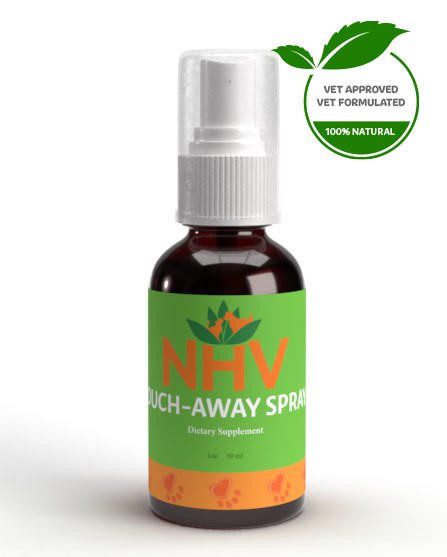
Natural Cat Allergy Spray for Hot Spots
buy 2 and save $3
Ouch Away for Cats
Protect your cat’s skin naturally. Sensitivities to food, environmental allergens and biting insects can cause your kitty to lick or bite irritated skin, causing a ‘hot spot’ to form. NHV Ouch Away for Cats is a topical spray that helps soothe cat skin allergies and recover fur loss.


Ouch Away for Cats
Protect your cat’s skin naturally. Sensitivities to food, environmental allergens and biting insects can cause your kitty to lick or bite irritated skin, causing a ‘hot spot’ to form. NHV Ouch Away for Cats is a topical spray that helps soothe cat skin allergies and recover fur loss.

Natural Support for Cat Skin Allergies and Hot Spots
What Is A Hot Spot?
A hot spot (aka moist dermatitis) is an inflamed skin lesion that may be further irritated by licking, scratching and chewing, often turning red, becoming infected, and 'hot' to the touch. Kitties are very sensitive and may have very delicate skin, so even small changes in their diet or environment can strongly affect them. The inflamed skin can be very uncomfortable for your kitty, and they may even experience fur loss.
Causes of Hot Spots on Cats
A few factors can cause hot spots in our feline friends, like food sensitivities, allergens in the environment, biting insects, and infections. Kitties with longer coats may be more susceptible to hot spots, especially when the weather is humid (like in the summer months). In most cases, hot spots are caused by allergies to the environment or something in their diet. Cat skin allergies most often develop on their paws, face, ears, front legs, and belly, but itchiness all over the body is common as well.
How NHV's Natural Cat Allergy Spray Relieves Inflamed Skin
If your kitty is licking, biting, or scratching a specific area, they may be experiencing a great level of discomfort. Ingredients like Chamomile, Marigold and Aloe vera are beneficial for soothing skin lesions, reducing swelling and easing discomfort. The immunostimulatory properties in Ouch Away help regulate a healthy histamine response to rebalance the immune system and help prevent infection. Herbs like Tea Tree oil and Lemongrass are effective topically against biting insects (fleas, mites, mosquitos and flies) and fighting infections, while ingredients like Rosemary encourage hair regrowth (recovery from alopecia).
Help Support your Cat Naturally
NHV Ouch Away Spray is an all-natural spray that is non-toxic for your furkiddo and formulated by an experienced herbalist and holistic vet. To learn more about hot spots in cats, check out our blog post about it. Get in touch with an NHV pet expert if you have questions about your kitty’s unique health needs.
Made with the finest, organically grown, or ethically harvested herbs. Made specifically for pets, vet-formulated and vet approved.
How to Administer
Topical Spray: Spray several times a day to affected area(s) until healed. It may sometimes be necessary to shave or trim your pet’s hair so that the Ouch Away Spray reaches the affected area. If necessary, cover the affected area with gauze dressing.
Caution
Do not spray near or into eyes or nose. May initially sting on open cut. A vet examination prior to use of this product is recommended. If your pet’s condition does not improve or deteriorates consult your vet and stop the use of the product.
Information presented by NHV Natural Pet Products is for educational purposes only.
Natural Support for Cat Skin Allergies and Hot Spots
What Is A Hot Spot?
A hot spot (aka moist dermatitis) is an inflamed skin lesion that may be further irritated by licking, scratching and chewing, often turning red, becoming infected, and 'hot' to the touch. Kitties are very sensitive and may have very delicate skin, so even small changes in their diet or environment can strongly affect them. The inflamed skin can be very uncomfortable for your kitty, and they may even experience fur loss.
Causes of Hot Spots on Cats
A few factors can cause hot spots in our feline friends, like food sensitivities, allergens in the environment, biting insects, and infections. Kitties with longer coats may be more susceptible to hot spots, especially when the weather is humid (like in the summer months). In most cases, hot spots are caused by allergies to the environment or something in their diet. Cat skin allergies most often develop on their paws, face, ears, front legs, and belly, but itchiness all over the body is common as well.
How NHV's Natural Cat Allergy Spray Relieves Inflamed Skin
If your kitty is licking, biting, or scratching a specific area, they may be experiencing a great level of discomfort. Ingredients like Chamomile, Marigold and Aloe vera are beneficial for soothing skin lesions, reducing swelling and easing discomfort. The immunostimulatory properties in Ouch Away help regulate a healthy histamine response to rebalance the immune system and help prevent infection. Herbs like Tea Tree oil and Lemongrass are effective topically against biting insects (fleas, mites, mosquitos and flies) and fighting infections, while ingredients like Rosemary encourage hair regrowth (recovery from alopecia).
Help Support your Cat Naturally
NHV Ouch Away Spray is an all-natural spray that is non-toxic for your furkiddo and formulated by an experienced herbalist and holistic vet. To learn more about hot spots in cats, check out our blog post about it. Get in touch with an NHV pet expert if you have questions about your kitty’s unique health needs.
Made with the finest, organically grown, or ethically harvested herbs. Made specifically for pets, vet-formulated and vet approved.
How to Administer
Topical Spray: Spray several times a day to affected area(s) until healed. It may sometimes be necessary to shave or trim your pet’s hair so that the Ouch Away Spray reaches the affected area. If necessary, cover the affected area with gauze dressing.
Caution
Do not spray near or into eyes or nose. May initially sting on open cut. A vet examination prior to use of this product is recommended. If your pet’s condition does not improve or deteriorates consult your vet and stop the use of the product.
Information presented by NHV Natural Pet Products is for educational purposes only.
Published: March 22, 2019